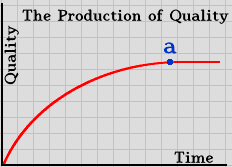
The contention that this site may be as good as I, the author, can make it can be explained using some simple economic terminology.
The relationship between output (which in this case is the quality of this site) and inputs (basically time and talent is known as a production function. A production function with only one variable input will generally have a shape similar to the one illustrated below. Additional time, the one variable input because talent is a constant, has a big impact when the project was in its early stages, but as it has matured, additional time has a smaller and smaller impact. (This idea has a name--the law of diminishing returns.) It is possible for quality to reach a peak after some amount of time has been spent working on the project, which happens in the graph below at point a. In the illustration below, additional time spent working on the project after a has been reached yields no improvement in quality.

However, the actual production function involved in this project may be a bit different from that illustrated above. It may be the curve gradually gets flatter but that no peak is ever reached. Alternatively, it may be that after a peak is reached, the curve may actually turn downward, so that additional effort may in fact make the product worse. If you think about papers or school projects to which you devoted a great deal of of time, you should be able to relate these efforts to a production function such as that above, and you can decide for yourself which of these three possible production functions seems the most likely. My contention in the preface was only that I have reached a point on my production function at which the curve has become very, very flat.
Talent may be a constant for any one individual, but it varies from individual to individual. Those who have less talent in constructing economic web sites than I have have curves which lie below mine, and those who have more talent have curves which are above mine. There are plenty of people who have higher curves than I have, but they are almost certain to have more useful things to do with their time than to work on web sites like this one. Economists believe that people base their actions on the costs and benefits of those actions, and it was only because of very unusual circumstances that the benefits I received for constructing this site outweighed the costs. Sooner or later one of those people who are more talented than I will run into an equally strange set of circumstances, and will build a site that will render this one obsolete.1
Are you not delighted with this economic explanation as to why this site is not better than it is?
R Schenk ;-)
March 1998
All material in these pages is copyright by Robert Schenk 1997-8 and
earlier dates. It may not be copied or distributed without the
author's permission. Send him
any comments, suggestions, bug reports, etc.
1 Of course things are always more complex than simple
theory suggests. Someone more or less talented may do a site with a
different perspective, and then both could co-exist. If someone a bit
more talented did a site with the same perspective, not all of this
new site would be better. Rather 60% might be better. Would that be
enough to render this site obsolete? What happens with joint
authorship--can talent be combined so that the total exceeds the
highest of the individuals involved? And if it can be, why do we not
see more books written jointly?
The assumption that this site will be made obsolete by a better product is probably very naive, reflecting an economists belief that markets work by promoting good products and discouraging bad. If an inferior site is constructed by a big publisher and heavily marketed, no one would bother with this site. In a world of limited information, a heavily marketed inferior product can easily triumph over a superior product provided that it is "good enough."